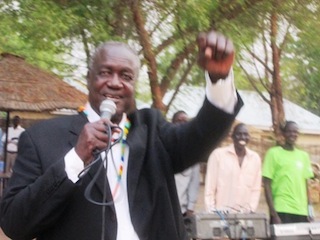“Make Jonglei attractive”, exiled South Sudanese tell governor
April 29, 2013 (KAMPALA) – Peter Ayom moved to Uganda with his family fleeing insecurity, a poor health care and the fledgling education system in Jonglei state to find a better future for his two children and five other relatives who he is supporting through their studies.

But Jonglei’s governor, Kuol Manyang Juuk, is seeking to reverse the trend, recently calling on South Sudanese in the diaspora to return to the young nation and has ordered members of his government to repatriate their families by the end of the year.
Despite relative peace in the new country, Jonglei state is riddled by cattle raids amongst pastoralist communities and a rebellion in Pibor county headed by David Yau Yau that have claimed thousands of lives in recent years.
Reacting to the governor’s call, South Sudanese in Uganda challenged the governor to prove that the country is now safe for their children and questioned whether the nascent education system would be able to accommodate them if they all returned.
“There are many primary schools in Jonglei state but only two public secondary schools which lack many scholastic materials,” said Ayom, who is himself studying at a university student in Kampala.
Jonglei state governor said that children of state officials would be able to finish their studies if they had already enrolled at university but not if they were studying below that level.
Governor Manyang said he was serious about the order but has not specified the consequences for officials who disobey his decision.
If the tuition fees paid abroad were instead paid into the South Sudanese education system, he said, the standard of education in the country may improve. South Sudan is among the least literate countries in the world – a consequence of decades of civil and neglect – with less the 30% of people able to read and write.
The Governor’s new policy has been met with mixed feelings by South Sudanese in Uganda.
“The standard of living in South Sudan is very expensive coupled with insecurity in villages and I can’t afford paying my tuition fees and catering for my family in Bor,” said Abraham Ayuen, who is studying in Uganda and rents a house for his family in Kenya.
Pan Philip, a second year university student who says he supports Governor Kuol Manyang’s directives, thinks that the policy needs to be adopted by the central government in Juba for it to be effective.
“If the decree is to come from [the] President of South Sudan, I think it will be bold enough to achieve a certain change in reducing wiring of money to foreign countries to maintain families in London, Washington DC and Sydney,” Philip said, adding “this will reduce corruption.”
John Mogga, another South Sudanese living in Kampala, said he supports the governor’s decision and urged the Jonglei governor to sack state ministers whose families are abroad and replace them with younger officials who have their families in South Sudan.
“In the first place, the governor should not appoint a minister whose home is abroad and expect service delivery,” Mogga added.
“Health facilities have to be made available so that women don’t die during child delivery and child mortality is reduced. What I mean is that, the government has a duty to attract people back home but not only issuing orders,” Ayom added when asked how these services will be built when the citizens have fled to neighboring counties.
Many South Sudanese students and families have not returned to South Sudan from the countries where they took refuge during the two decade Sudanese civil war that ended with 2005 Comprehensive Peace Agreement (CPA), which allowed South Sudanese to overwhelming vote for secession in 2011.
As well as its services Jonglei state also has a notoriously bad road network making traveling in the state nigh impossible during rainy season.
(ST)
